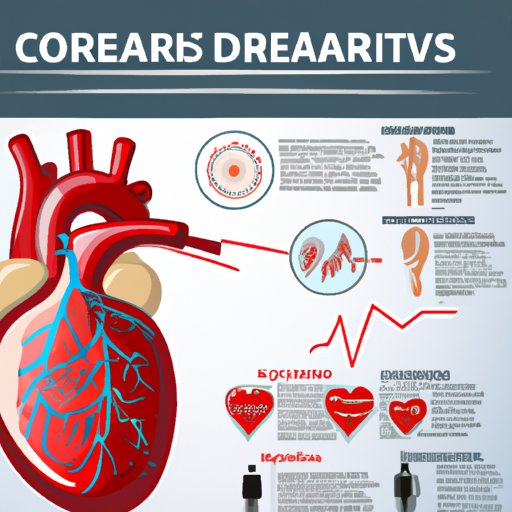
Introduction
Coronary heart disease is a condition that affects many people around the world. Whether you have experienced it personally or know someone who has, the effects of this disease can be long-lasting and devastating. In this article, we will explore what causes coronary heart disease, including lifestyle factors and medical conditions. We will also discuss the latest research on the topic and provide examples of risk reduction and prevention strategies.
What is Coronary Heart Disease?
Coronary heart disease occurs when the arteries that supply blood to the heart become narrowed or blocked. This can lead to a range of symptoms, including chest pain, shortness of breath, and fatigue. In some cases, this condition can lead to a heart attack.
The causes of coronary heart disease are complex and multifactorial. In some cases, lifestyle factors such as poor diet and lack of exercise may contribute to the development of the disease. In other cases, medical conditions such as obesity, diabetes, high blood pressure, and high cholesterol may play a role.
Factors that Increase the Risk of Coronary Heart Disease
Several factors can increase the risk of coronary heart disease. Lifestyle factors such as poor diet and lack of exercise can contribute to the development of the disease. Medical conditions such as obesity, diabetes, high blood pressure, and high cholesterol can also increase the risk of developing coronary heart disease.
To visualize how some of these factors are related to coronary heart disease, check out the following infographic:

Latest Research on Coronary Heart Disease
Research on coronary heart disease is ongoing. Scientists are trying to better understand the genetics and ageing factors that can contribute to the development of the disease. They are also exploring other factors, such as stress and inflammation, that may play a role.
Examples of Risk Reduction
Fortunately, there are several ways to reduce the risk of developing coronary heart disease. For example, making changes to your diet and lifestyle can lower your risk. Also, several medications, such as statins, can help reduce cholesterol levels and lower the risk of heart attack and stroke.
Real-life examples of people who have reduced their risk of developing coronary heart disease can be inspiring. Making simple changes to your daily routine, such as eating more fruits and vegetables, taking daily walks, and quitting smoking, can have a significant impact on your heart health.
Prevention Strategies
Prevention is key when it comes to coronary heart disease. A few small lifestyle changes can make a big difference in reducing your risk. Regular exercise, a healthy diet, monitoring your blood pressure, and getting regular check-ups are all important strategies for preventing this condition.
Proactive lifestyle changes can also help reduce the risk of developing other chronic conditions, such as diabetes and obesity, which can contribute to the development of coronary heart disease.
Conclusion and Call-to-Action
Coronary heart disease is a complex condition with multifactorial causes. While the risk factors for developing the disease are numerous, there are several things you can do to reduce your risk. By making simple lifestyle changes and working with your doctor to manage any medical conditions, you can take control of your heart health. We encourage you to take action today and start making positive changes that will benefit your heart and overall health.
For more information and resources on coronary heart disease, visit the American Heart Association website or talk to your doctor.





